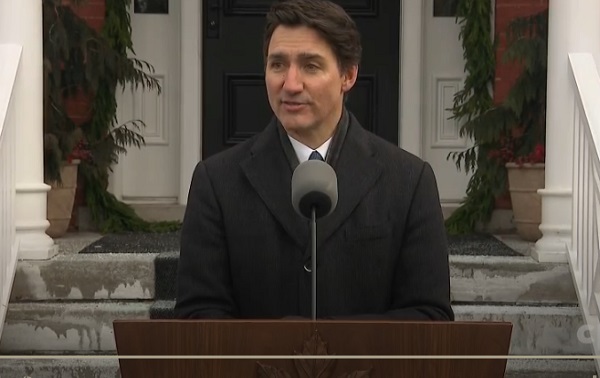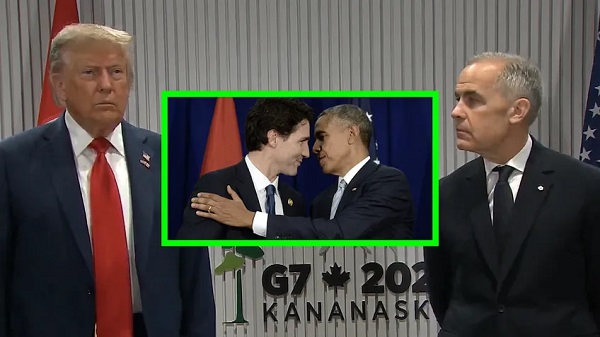National
Trudeau Resigns! Parliament Prorogued until March 24

From LifeSiteNews
Liberal Party leader Justin Trudeau will officially resign as prime minister of Canada after a new Liberal Party leader is found.
Prime Minister Justin Trudeau has announced his resignation as prime minister of Canada and leader of the Liberal Party.
On January 6, 2025, Justin Trudeau announced his impending retirement as Canada’s prime minister after months of abysmal polling predicting a massive Conservative victory in the fall 2025 election.
“I intend to resign as party leader, as prime minister, after the party selects its next leader through a robust, nationwide, competitive process,” he told reporters outside the Rideau Cottage in Ottawa.
“Last night, I asked the President of the Liberal Party to begin that process,” Trudeau continued.
“It has become obvious to me through the internal battles that I cannot be the one to carry the Liberal banner into the next election,” he added.
Trudeau revealed that he plans to stay on as leader until the Liberal Party’s National Board of Directors selects a new leader. He also asked for Parliament to be prorogued until March 24, by which time a new leader should be selected.
The prime minister had repeatedly assuring Canadians that he would lead the Liberal Party into the 2025 election. However, inside sources revealed that Trudeau’s resignation was inevitable considering his party’s loss of popularity.
Trudeau has served as prime minister since 2015, winning three consecutive elections. However, polls have predicted a massive Conservative victory as Canadians appear to have tired of Trudeau’s radical agendas, including pushing abortion, climate regulations, and LGBT ideology targeted at children.
Trudeau’s resignation comes just a few weeks after both his Housing Minister Sean Fraser and Deputy Prime Minister Chrystia Freeland left the Liberal government.
Likewise, last week, Liberal MPs from Quebec appeared to have banded together at least unofficially to demand Trudeau’s immediate resignation.
Additionally, New Democratic Party (NDP) leader Jagmeet Singh, whose party has been propping up the Liberal minority government, called on the prime minister to resign. Singh said that, should Trudeau not step down voluntarily, he would consider voting non-confidence, saying, “all tools are on the table.”
Justin Trudeau, 53, is the son of the late Canadian prime minister Pierre Trudeau. Pierre Trudeau held the office from 1968 to 1979, and then from 1980 until his resignation shortly before the elections of 1984. Justin Trudeau, known to Canadians as a child, re-entered public life briefly when he gave the eulogy at his father’s state funeral in 2000. A drama teacher by profession, Justin Trudeau successfully ran for office in the 2008 federal elections and was elected leader of the Liberal Party in 2013.
Energy
Who put the energy illiterate in charge?

This article supplied by Troy Media.
Canada’s energy policy is being shaped by politicians who don’t actually understand how energy works. That’s not just embarrassing. It’s dangerous
Canada’s energy future is being held back by a critical obstacle: our elected officials don’t understand energy.
At all three levels of government, most politicians lack even a basic grasp of how our energy systems function. That ignorance isn’t just a knowledge gap—it’s a leadership crisis. Energy systems are evolving rapidly, and our leaders are ill-equipped to manage the complexity, tradeoffs and consequences involved. With few exceptions, their understanding is superficial, shaped more by talking points than substance.
By “energy systems,” I mean the complex web of technologies, infrastructure, markets and regulations that generate, distribute and manage power—from oil and gas to hydro, nuclear, wind and solar. These systems are deeply interconnected, constantly changing and central to every aspect of modern life. Yet the people making decisions about them often have little idea how they actually work.
This shows up frequently in public life: dodged questions, scripted answers, vague platitudes. Many politicians skate across the surface of issues with the thinnest understanding. The old adage “a little knowledge is a dangerous thing” perfectly describes Canadian energy politics today.
Decisions about energy directly affect household utility bills, climate goals, industrial competitiveness and grid reliability. Yet politicians tend to be tethered to the dominant energy source in their own region—oil and gas in Alberta, hydro in Quebec, nuclear in Ontario—without grasping how those systems connect or conflict. Canada’s energy landscape is fragmented, with each province operating under its own regulatory framework, infrastructure constraints and political pressures. That makes coordination difficult and systems-level thinking essential.
This isn’t a left-versus-right issue. It’s not oil and gas versus renewables. It’s a national failure to understand the integrated systems that power our lives and economy. Canada is, functionally, energy illiterate, and our elected officials reflect that reality. We flip a switch, pump gas, turn up the thermostat and rarely ask how or why it works, or what it costs in environmental or economic terms.
Take the Clean Electricity Regulations as one example. Introduced by the federal government to drive Canada’s electricity grid to net-zero emissions by 2035, the CERs require provinces to sharply reduce or eliminate fossil fuel-based power. But in Alberta and Saskatchewan, where coal and natural gas still dominate, those regulations landed with a thud. The federal government failed to account for regional infrastructure limitations, market structure
differences and technology readiness. The result? Immediate backlash, legal threats and political gridlock—not because climate action is unwelcome, but because the policy was crafted in a vacuum of systems-level understanding.
Adding to the problem is the dominance of bureaucrats and political handlers in shaping what passes for energy messaging. Speeches are often a patchwork of statistics and sanitized clichés, stripped of nuance or depth. Many politicians simply deliver what they’re handed, guided more by risk management than insight. The result is policy that’s disconnected from the realities it aims to change.
A handful of elected officials do have real-world energy experience, but even that is often narrow, based on one role or one sector. It rarely translates into the kind of broad, integrated knowledge needed to lead across multiple interdependent systems. The risks of this fragmented thinking are immense.
What’s needed is mandatory education—an energy information and insights toolkit for anyone seeking public office. This shared curriculum would cover how electricity and fuel systems work, the economics of energy markets, climate dynamics, environmental trade-offs and public policy principles. It should be grounded in both natural and social sciences and structured to develop systems thinking, so that decisions are informed by how energy technologies, markets and governance truly interact.
Imagine if thousands of politicians—urban and rural, left and right, federal and local—learned from the same textbook. Politics wouldn’t vanish. Disagreements wouldn’t disappear. But the debate would shift from tribal talking points to informed discussion.
And for once, Canada might start moving forward on energy, not with noise or paralysis, but with purpose.
Bill Whitelaw is a director and advisor to many industry boards, including the Canadian Society for Evolving Energy, which he chairs. He speaks and comments frequently on the subjects of social licence, innovation and technology, and energy supply networks.
Troy Media empowers Canadian community news outlets by providing independent, insightful analysis and commentary. Our mission is to support local media in helping Canadians stay informed and engaged by delivering reliable content that strengthens community connections and deepens understanding across the country.
espionage
From Sidewinder to P.E.I.: Are Canada’s Political Elites Benefiting from Beijing’s Real Estate Reach?

Garry Clement: Politicians even appeared to benefit from the relationships cultivated with Chinese officials and members of Bliss and Wisdom
Editor’s Note:
This opinion column by Garry Clement analyzes a deeply reported investigation into the land acquisitions and foreign affiliations of the Bliss and Wisdom Buddhist group in Prince Edward Island. Clement argues that the federal government, law enforcement, and Canadian officials have failed to confront what he sees as a growing national security risk—including strategically significant purchases of critical agricultural land.
His warning is underscored by a recent CBC/Radio-Canada investigation, which examined Bliss and Wisdom’s extensive land holdings, financial networks, and reported ties to the Chinese Communist Party’s United Front Work Department—allegations the religious group denies.
That probe featured findings from Clement, former CSIS officer Michel Juneau-Katsuya, and publisher Dean Baxendale—all co-authors of the forthcoming book Canada Under Siege, which devotes entire chapters to these Prince Edward Island land dealings.
Readers should understand a crucial piece of context: Clement, a former senior RCMP officer, and Michel Juneau-Katsuya were central figures in the joint RCMP-CSIS Sidewinder investigation of the 1990s. That probe examined how the Chinese Communist Party was infiltrating Canada’s economy—most notably through massive and suspicious real estate acquisitions in Vancouver and Toronto. Parallel investigations, including the RCMP’s Project Sunset, examined Beijing’s growing influence over Vancouver’s ports and critical infrastructure. Yet despite their explosive findings, these intelligence probes were buried or gutted. Now, more than two decades later, the same warning signs are surfacing in pastoral Prince Edward Island—and once again, the threat is being ignored.
The Bureau is a reader-supported publication.
To receive new posts and support my work, consider becoming a free or paid subscriber.
OTTAWA — When our investigative team began looking into the Bliss and Wisdom Buddhist organization’s activities on Prince Edward Island, we expected a quiet story of land development and foreign investment. What we uncovered instead was a chilling portrait of political complacency, potential foreign influence, and the fragility of democratic accountability in Canada.
Over the course of our work, we tracked millions of dollars in unexplained cash inflows from Taiwan and mainland China, funneled through Canadian banks and into real estate and development projects across PEI. These were not obscure transactions—they were significant and frequent enough to raise alarms in any functioning system of democratic oversight.
And yet, those alarms never sounded.
Neither local politicians nor federal leaders lifted a finger. Some even appeared to benefit from the relationships cultivated with Chinese officials and members of the Bliss and Wisdom organization, whose quiet influence grew in tandem with land purchases and political access. The very leaders entrusted to safeguard transparency and public interest were, at best, disengaged, and at worst, complicit.
The RCMP, for its part, has thus far declined to launch a public investigation—a silence that is deafening, particularly in light of recent national debates about foreign interference in Canadian politics. How can we claim to take such threats seriously if a clear case of questionable foreign financial involvement in one of our provinces is allowed to pass without scrutiny?
What made this investigation even more revealing was the contrast between institutional inaction and the commitment of ordinary citizens. Residents of PEI, concerned about unchecked land acquisitions, foreign influence, and environmental stewardship, were the first to sound the alarm. They provided testimony, documents, and moral courage. They believed that Canada’s democratic institutions should still function as intended—on behalf of the public, not in service to silence or convenience.
In a time when democratic erosion often feels like a faraway problem, PEI is a case study of how it happens at home: not through coups or grand conspiracies, but through the quiet neglect of responsibility, the normalization of secrecy, and the sidelining of civic duty.
Our investigative team did what governments refused to do. We followed the money. We asked hard questions. We connected the dots. And while we do not claim to have all the answers, we believe this is precisely the kind of work that institutions—law enforcement, media, elected officials—should have done long ago.
Democracy doesn’t collapse overnight. It erodes when those in power forget who they serve. But it also endures, stubbornly, through the vigilance of citizens who refuse to look away.
It is time for accountability—not just from those involved with Bliss and Wisdom, but from the public servants who allowed this to happen under their watch.
Former senior RCMP officer Garry Clement consults with corporations on anti-money laundering, contributed to the Canadian academic text Dirty Money, and wrote Canada Under Siege, and Undercover, In the Shady World of Organized Crime and the RCMP
The Bureau is a reader-supported publication.
To receive new posts and support my work, consider becoming a free or paid subscriber.
Invite your friends and earn rewards
-

 Alberta21 hours ago
Alberta21 hours agoUnified message for Ottawa: Premier Danielle Smith and Premier Scott Moe call for change to federal policies
-

 Alberta1 day ago
Alberta1 day agoCentral Alberta MP resigns to give Conservative leader Pierre Poilievre a chance to regain a seat in Parliament
-

 Business2 days ago
Business2 days agoTrump makes impact on G7 before he makes his exit
-

 International24 hours ago
International24 hours agoTrump puts new price tag on Canada joining “Golden Dome”
-

 Alberta2 days ago
Alberta2 days agoAlberta health care blockbuster: Province eliminating AHS Health Zones in favour of local decision-making!
-

 Daily Caller2 days ago
Daily Caller2 days ago‘Not Held Hostage Anymore’: Economist Explains How America Benefits If Trump Gets Oil And Gas Expansion
-

 Alberta2 days ago
Alberta2 days agoAlberta pro-life group says health officials admit many babies are left to die after failed abortions
-

 Business20 hours ago
Business20 hours agoCanada’s critical minerals are key to negotiating with Trump








